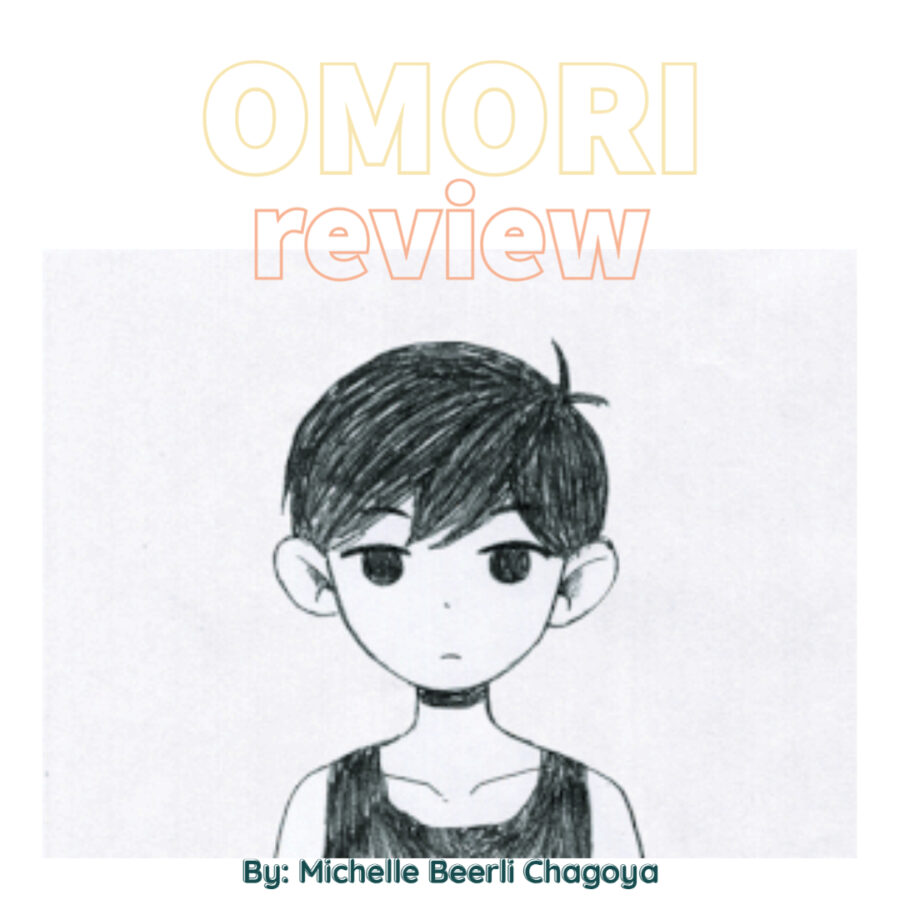OMORI review
Spoiler-free review on a psychological horror RPG game made by independent creator “omocat”
June 10, 2021
OMORI is a game that, despite assumptions at first glance of being cute and inviting, is one that in reality will end up sneaking up on you and subvert your expectations. Partially due to how well it delivers and portrays its major themes, this game is nothing short of a masterpiece.
The game starts off in a room called “white space.” A black light bulb hangs from the ceiling, the floor is cold, but you have everything you need. A laptop, a cat who asks, “waiting for something to happen?”, a sketchbook, and a tissue box. The player takes the role of a kid named OMORI who just sort of exists here, telling you that he’s been living here for as long as you can remember. A white door presents itself, and after interacting with and picking up a knife, you are permitted to exit said door.
This leads the player to a colorful, fun, perfect world filled with endless adventure, and most importantly, your friends. Just through their colors you can tell that they are not like you. You are special: you are empty and you are hollow. You are black and white, while they are colorful and full of life. You get a feeling that things weren’t always like this, that you weren’t always in white space.
Meeting OMORI’s friends is comparatively a breath of fresh air after the opening scene and whitespace. There’s Kel, who is the happy-go-lucky best friend type looking for fun, Aubrey: the starry-eyed yet short tempered tomboy, and Hero: the older brother figure who tries to mediate the squabbles between Kel and Aubrey. Shortly after, you meet Mari and Basil, the last two members. Mari is the nurturing, deeply caring older sister figure who also plays referee between the kids, and Basil is the timid artistic type who likes taking photos as keepsakes. Mari’s picnic basket and her blanket are safe spaces where you can save, heal, and spend good times with your friends. This leads the player to let their guard down. Everyone is happy, and everyone is okay…except it isn’t long until something isn’t okay.
The player and crew venture out to Basil’s house. Doing as Basil does, he takes a photo as a memory, but it turns out blurry, symbolizing that this is a blurred reality, and that the game is sending you a red flag from the very beginning. Basil drops a photo from his photo book, but he doesn’t recognize it. It was something that he shouldn’t have seen, a repressed memory, something that he might have forgotten. For a split second an image flashes of a broken violin at the bottom of the stairs. Basil’s eyes turn red, his expression fearful, as black matter starts taking over the floor around him.
You are involuntarily woken up in white space, without your friends, without reality, and without a way to escape. Looking at the last page of OMORI’s sketchbook, there is something new, something that stares at you, something that will follow you. Something. The whole psychological horror theme begins to click. With this game, nothing is always something.
You awaken to reality, a less colorful world than before, but more colorful than white space. You are no longer OMORI, you are Sunny, and you are no longer black and white, you’re a kid with life. After going back to sleep and being awoken by hunger, you notice that the windows are bright red, the stairs are longer, and there are disembodied arms reaching for you on the way down. This is nothing like the other world. After reaching the bottom of the stairs, your ears are filled with this obnoxious knocking sound, so you go to the door to see who it is. It’s Mari. However, a woman with her mouth wide open jumps and scares you. That’s not Mari.
When you return to the other world, Basil is missing, and thus the journey begins where you set out and look for Basil with the gang and the prologue ends. The truth is, your story is already over. You just have to remember it.
In order to fully analyze the game and its incredible symbolism, it would hold many spoilers. This game is an experience that is best to be experienced mostly blind. OMORI is a game that will lure you in with its cute art style and fun earthbound-esque game mechanics, and then completely shatter you with its heart wrenching story. This is a game that respects your intelligence, and will not hand feed you the full story. Not to mention, the beautifully written and nuanced characters who each deal with grief in their own ways. From the stunning artwork that’s able to depict a full range of emotions, to the small seemingly insignificant details that paint this world so vividly, to the faint blossom of hope that the true route concludes with, it is a game worth experiencing, putting it into words wouldn’t do it any justice.
OMORI does not shy away from heavy topics such as depression, anxiety, reliving trauma, self-destructive habits, PTSD, the struggle of grasping with reality, and dissociative amnesia just to name a few. It handles such topics in a tactful manner. Dissociation often presents itself as a disruption in one’s psychological functions, including consciousness and perception. In fact, it uses the function of a role playing game to its advantage, making some of the in-game decisions eerily echo real life internal conflicts, and also plays with how traumatic experiences show themselves.
OMORI constantly uses this mechanic of forcing you, the player, to do something uncomfortable in order to progress. You’ll be forced to face your fears and your friends in inescapable battles even when they beg you to stop and repeatedly go through several unnerving nightmare sequences that reflect Sunny’s deepest traumas in a warped and stomach-turning fashion. It’s not until much later that you get to see parts of the bigger picture, and this game makes those answers feel like a reward.
However, this is not a game about losing yourself to the despair of the past and the game shows that. This game is about acknowledging the darker parts of yourself and your psyche that you live with every day and finding the strength to face it. The past and the painful memories that come along with it can break someone down and destroy their life, but if those memories are faced head on with the support of people that love you most, they can be overcome and lead to a happy ending. OMORI paints a relatable picture of the complex feelings of guilt and the twists and turns one’s mind can take in the face of tragedy.
OMORI is a story that deserves to be told. Even if your memories are a little sad now, it’s never too late to make some better ones.

